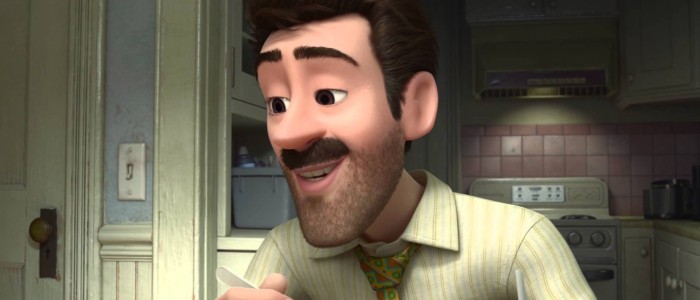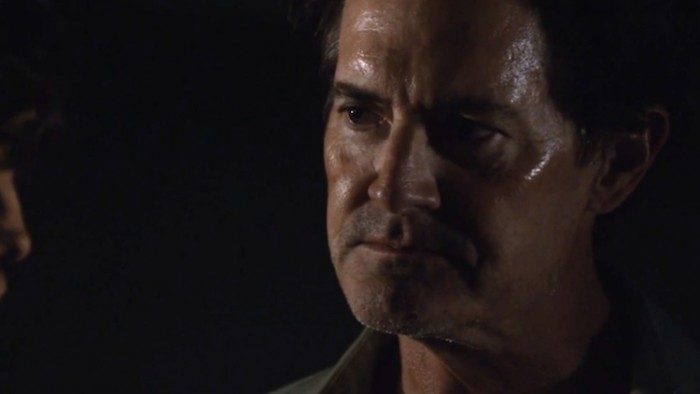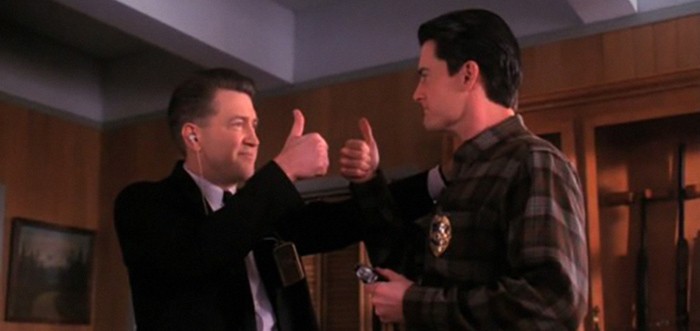Kyle MacLachlan On 'Inside Out,' Personal Rhythms, And The Excitement Of 'Twin Peaks'
It says a great deal about Kyle MacLachlan's work in Pixar's Inside Out that I didn't even recognize him at first as the voice of Riley's father. I just accepted the character as exactly who the film presents him to be, without thinking of the actor behind the role. Some of that comes from the fact that MacLachlan isn't part of the group of actors who regularly do voice roles, so I don't expect him in animation. But he's no stranger to animation (he was Superman!), and the strange rhythms of voice work clearly agree with him.
"Strange rhythms" could be a description for the actor's career overall. After the David Lynch films Dune and Blue Velvet, MacLachlan created the unforgettable Special Agent Dale Cooper for Twin Peaks, and has gone on to build other memorable roles, from The Hidden to Portlandia, Sex and the City, Desperate Housewives, and even Showgirls. "Predictable" is not a word anyone could apply to MacLachlan's choices.
In person, MacLachlan is exactly the thoughtful and attentive, quirky guy one might hope he'd be. Our conversation, prompted by his work in Inside Out, revolved around his personal quirks and rhythms, and touches upon a diverse set of career milestones, from his Pixar work to Agents of S.H.I.E.L.D. and, of course, Twin Peaks.
You're in a neat position here as the voice of a supporting character, but one who really helps provide an familiar point of view for the audience.
They came to me, and as an actor it's sometimes scary when people say they just want you. Like "...ok, who am I?" So I approached it pretty much as I would anything else, and as a dad how I might deal with my son. I'm a pretty gentle person, a soft-spoken person, so raising my voice and going to DEFCON 2 doesn't happen very frequently. But I understand it, and while my son can be sassy, he hasn't quite gone to the level that our Riley does.
But part of my efforts to were to contribute to the role and bring in my own personality a little bit. Pete Docter and Jonas Rivera had written an extraordinary character. They were also open to other suggestions and ideas and interpretations. All within what we were going for, of course, but they were OK with me developing and trying different things, like the monkey sounds. They welcomed my contributions, which was great. They didn't have to use them! But they welcomed them.
You've done other animation in the past; is working in the booth a freeing experience?
It is, kind of, because you're really only concentrating on the voice. I realized that when I do ADR, which is a different thing, I typically close my eyes and I hear it rhythmically, as opposed to watching myself on the screen and trying to match my voice. I just kind of go inside. I did the same thing on this. I was kind of playing it in my head, because they don't give you playback. They show you ideas, and there are some rudimentary sketches and things, but basically you're playing whatever that movie is in your own mind. So that's what I did. I'm sort of watching myself do it and seeing how I might respond, maybe lean in slightly, that idea is running concurrently in my mind as I'm doing the lines. So that was kind of interesting.
Is approaching work rhythmically part of your overall toolset?
I guess so! I'm pretty musical, but the rhythm of something is... I have my own natural rhythms, which are somewhat quirky. But I think I have a way that feels comfortable to me, and probably wouldn't feel comfortable to someone else, of saying something, moving a certain way. So that's what I try to bring in, or encourage, or add. It's an instinct thing, and it's one of the reasons I like David Lynch so much, because rhythmically his work is atypical. It's unusual, the way he shoots a scene, where the camera goes, how it moves. All of that is interesting to me.
 That's one reason I asked about rhythm — I know on some films Lynch will play back music on set, to set a rhythm or a mood. Is that a thing you ever experienced with him?
That's one reason I asked about rhythm — I know on some films Lynch will play back music on set, to set a rhythm or a mood. Is that a thing you ever experienced with him?
You know, I don't remember if we did that. There are some famous stories about Blue Velvet, when Dean Stockwell and Dennis Hopper were working together, and the script originally had Dennis singing the song [Roy Orbison's 'In Dreams'] on that little stage. Dean was messing around with the work light and singing, and David was like "OK, let's go there." When you enter the environment of a Lynch set, the working environment, it of itself is creative. he really relies on those kind of happy accidents, and likes to embrace them.
When you're working with other people not on a Lynch set, how do your own quirky rhythms come into play?
It's one of the beauties of being an actor and working with other talented actors, that if you're in the mode, there's such a wonderful back and forth, which is essential. It's one of the tools, that you can actually work with someone and let something happen. If you change, or a word slips, or there's a different way you want to say something, if the other actor is there [in the moment], it influences them, and they throw it back to you. It's that back and forth. So when I'm doing my best work, it's just talking and listening. It's your standard kind of acting exercise, just talking and listening, and throwing back to the actor. It's catch, almost. That, when it's all working, like with Clark Gregg or Chloe Bennett [on Agents of S.H.I.E.L.D.], it's all about that. They bring their own reality, you bring your reality, and you get to meet and play.
 Even with everything you've already done, It seems like Agents of S.H.I.E.L.D. might be an unusual world unto it's own.
Even with everything you've already done, It seems like Agents of S.H.I.E.L.D. might be an unusual world unto it's own.
It was! I've not really done anything like that before. And the character, when he first came to me, Cal, was... not completely formed yet. He had a couple things, but I didn't know where anything was coming from. And the writers and creators were helping me along the way, but really it was, as the material developed and the scripts came in, I began to understand more about who he was, and the writers did as well. So we worked together on this, to create this character.
Is the fact that you and the writers are all finding the character at the same time an appealing aspect of TV?
It's a thrilling thing, and kind of frightening at the same time, because you don't know! You don't know where it's going to go. Each week you get a new script, and it's like "I.... don't know where they're going to take this guy, I hope I like it!" If not, then you have to figure it out. But that was a joy, to go on that journey.
Feature films, you know, everything is in place, so you can chart yourself through. And that can be exciting, too, because you know you're going to get to certain points, like you'll be in some place by act three and you know you can color something in a little bit, or hide another thing a little because you know it'll be revealed later. They're both good, just different.
 It seems like a kind of middle ground, then, to return to a character you created [for Twin Peaks], but haven't touched in a long time.
It seems like a kind of middle ground, then, to return to a character you created [for Twin Peaks], but haven't touched in a long time.
It's going to be interesting, it's going to be very interesting! I wish I knew! I'll go back and watch the series again, of course, to get in touch with my inner Cooper, and then plug in the 25 years, the distance of time it's been since then. I'll have to see what material David Lynch and Mark Frost have written. Everything is in place, the storylines are intact.
Did that surprise you as much as it surprised us?
That it came around again? Yes, very much so! I always harbored a secret wish to return to that character. There are a few characters I feel that way about, but Cooper was special. He's such an interesting guy that I thought it would be nice if that ever happened, but it was always kind of a pipe dream. Yeah. It's wild. I'm excited.
***
Inside Out is in theaters now.
